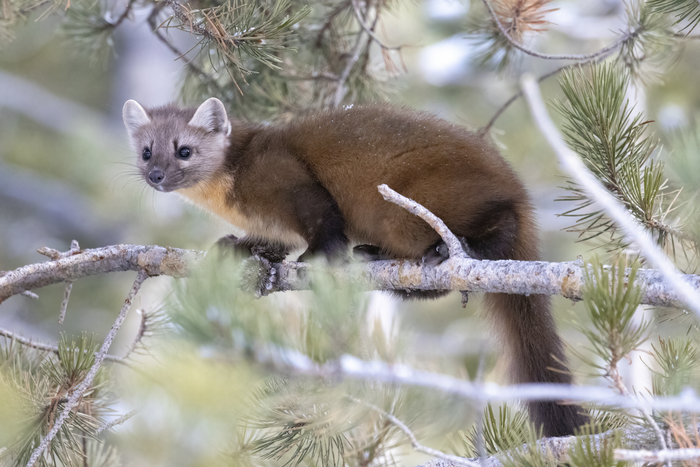A new study finds the microbial ecosystem in the guts of wild marten (Martes americana) that live in relatively pristine natural habitat is distinct from the gut microbiome of wild marten that live in areas that are more heavily impacted by human activity. The finding highlights an emerging tool that will allow researchers and wildlife managers to assess the health of wild ecosystems.

Credit: Rylee Jensen
A new study finds the microbial ecosystem in the guts of wild marten (Martes americana) that live in relatively pristine natural habitat is distinct from the gut microbiome of wild marten that live in areas that are more heavily impacted by human activity. The finding highlights an emerging tool that will allow researchers and wildlife managers to assess the health of wild ecosystems.
“Specifically, we found that wild marten in relatively undisturbed environments have more carnivorous diets than martens in human-affected areas,” says Erin McKenney, co-lead author of a paper on the work and an assistant professor of applied ecology at North Carolina State University. Marten are small mammals, related to weasels, ferrets and mink.
“In conjunction with our other work on carnivore microbiomes, this finding tells us the microbial ecosystems in carnivore guts can vary significantly, reflecting a carnivore’s environment,” McKenney says. “Among other things, this means we can tell how much humans are impacting an area by assessing the gut microbiomes of carnivores that live in that area – which can be done by testing wild animal feces. In practical terms, this work is revealing a valuable tool for assessing the health of wild ecosystems.”
“Our goal here was to determine how, if at all, human disturbance of a landscape affects the gut microbiome of American marten that live in that landscape,” says Diana Lafferty, co-lead author of the paper and an assistant professor of biology at Northern Michigan University. “And the answers here were pretty clear.”
For the study, researchers collected gut microbiome data from 21 marten. Sixteen marten were harvested during a legal trapping season. The remaining five were trapped safely and released in the Huron Mountain Club, which is located in Michigan’s Upper Peninsula.
“The Huron Mountain Club is particularly important for this study, because it’s relatively pristine – one of the largest, primeval forests in the eastern United States,” Lafferty says. “That makes it an excellent juxtaposition to the 16 marten that were harvested, since those were collected in regions that are more impacted by human activity.”
The researchers found that the gut microbiomes of marten in the pristine forest of the Huron Mountain Club were clearly distinct from the marten harvested in other areas.
“This reflects the fact that marten in relatively pristine forest are able to forage at a higher trophic level, meaning they occupy a higher place in the food web,” Lafferty says. “In other words, the marten in relatively pristine forest have a more carnivorous diet, whereas marten in areas where there are more people were more omnivorous. Basically, the findings tell us a disturbed landscape results in a significantly different diet, which is reflected in their gut microbiomes.”
“It’s also worth noting that we were able to trap and release the marten in Huron Mountain Club during the dead of winter because we designed and built custom box traps to protect them from the elements,” says Chris Kailing, a co-author of the paper who worked on the project while at Northern Michigan University. “That’s of interest because it makes winter sampling possible for future wildlife research even in harsh winter conditions.”
“This is the latest chapter in an ongoing body of research that is helping us understand carnivore gut microbiomes,” McKenney says. “Carnivore gut microbiomes are inherently more variable than the gut microbiomes of other animals. This study lends nuance to the emerging picture that all of this variability is not just noise. Rather, this variability stems from the nutritional landscape carnivores have access to – and that, in turn, reflects the health of the ecosystem carnivores inhabit. And that means that monitoring the gut microbiome of wild carnivores can offer us real insight into the ecosystems those carnivores live in.”
The paper, “The gut microbiome of wild American marten in the Upper Peninsula of Michigan,” will be published Nov. 3 in the open access journal PLOS ONE. The paper was co-authored by Sierra Gillman of the University of Washington; Miles Walimaa of Northern Michigan University; Macy Kailing of Virginia Tech University; and Brian Roell of the Michigan Department of Natural Resources.
The work was done with support from the Huron Mountain Wildlife Foundation.
Journal
PLoS ONE
Method of Research
Observational study
Subject of Research
Animals
Article Title
The gut microbiome of wild American marten in the Upper Peninsula of Michigan
Article Publication Date
3-Nov-2022
COI Statement
none




